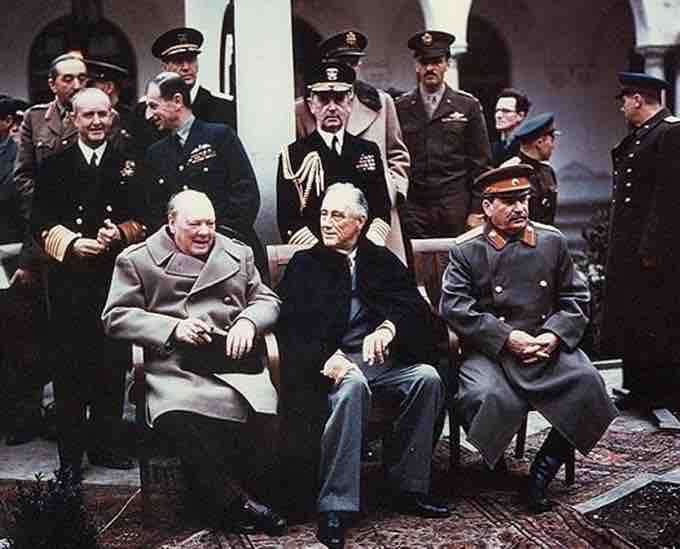THE YALTA CONFERENCE
The Yalta Conference, sometimes called the Crimea Conference, was held February 4–11, 1945 in the Livadia Palace near Yalta in Crimea. It was one of the three major wartime meetings of Allies Powers, together with the Tehran Conference in 1943 and the Potsdam Conference in July/August 1945. The Yalta Conference was led by the heads of government of the United States, the United Kingdom, and the Soviet Union, represented by President Franklin D. Roosevelt, Prime Minister Winston Churchill, and General Secretary Joseph Stalin, for the purpose of discussing Europe's post-war reorganization. Within a few years, with the Cold War dividing the continent, Yalta became a subject of intense controversy.

The Big Three at Yalta
Yalta summit in February 1945 with (from left to right) Winston Churchill, Franklin Roosevelt and Joseph Stalin. Also present are USSR Foreign Minister Vyacheslav Molotov (far right); Field Marshal Alan Brooke, Admiral of the Fleet Sir Andrew Cunningham, RN, Marshal of the RAF Sir Charles Portal, (standing behind Churchill); George Marshall, Army Chief of Staff and Fleet Admiral William D. Leahy, USN, (standing behind Roosevelt).
COMPETING AGENDAS
The meeting was intended mainly to discuss the re-establishment of the nations of war-torn Europe. Each leader had his own agenda for the meeting. Roosevelt wanted Soviet support in the U.S. Pacific War against Japan, specifically invading Japan. Churchill pressed for free elections and democratic governments in Eastern and Central Europe (specifically Poland). Stalin demanded a Soviet sphere of political influence in Eastern and Central Europe, an essential aspect of the USSR's national security strategy.
Poland was the first item on the Soviet agenda. Stalin stipulated that Polish government-in-exile demands were not negotiable: The Soviet Union would keep the territory of eastern Poland they had already annexed in 1939, and Poland was to be compensated for that by extending its western borders at the expense of Germany. Comporting with his prior statement, Stalin promised free elections in Poland, despite the Soviet sponsored provisional government recently installed by him in Polish territories occupied by the Red Army.
Roosevelt wanted the USSR to enter the Pacific War with the Allies. One Soviet precondition for a declaration of war against Japan was an American recognition of Mongolian independence from China and a recognition of Soviet interests in the Manchurian railways and Port Arthur as well as deprivation of Japanese soil (such as Sakhalin and Kuril Islands) to return to Russian custody since the Treaty of Portsmouth. These were agreed upon without Chinese representation or consent. Stalin agreed that the Soviet Union would enter the Pacific War three months after the defeat of Germany. Furthermore, the Soviets had agreed to join the United Nations, given the secret understanding of a voting formula with a veto power for permanent members of the Security Council, thus ensuring that each country could block unwanted decisions.
All three leaders ratified previous agreements about the post-war occupation zones for Germany: there were to be three zones of occupation, one zone for each of the three dominant nations (France would later get a portion when the USA and Great Britain divided up parts of their zones and gave them to France). Also, the "Big Three" agreed that all original governments would be restored to the invaded countries (with the exception of France, Romania, and Bulgaria; the Polish government-in-exile was also excluded by Stalin) and that all civilians would be repatriated.
KEY POINTS
Key points of the meeting were:
- Agreement to the priority of the unconditional surrender of Nazi Germany.
- After the war, Germany and Berlin would be split into four occupied zones. Stalin agreed that France would have a fourth occupation zone in Germany, but it would have to be formed out of the American and British zones.
- Germany would undergo demilitarization and denazification.
- German reparations were partly to be in the form of forced labor. The forced labor was to be used to repair damage Germany inflicted on its victims.
- Creation of a reparation council that would be located in the Soviet Union.
- It was agreed to reorganize the communist Provisional Government of the Republic of Poland that had been installed by the Soviet Union "on a broader democratic basis."
- The Polish eastern border would follow the Curzon Line and Poland would receive territorial compensation in the West from Germany. Churchill alone pushed for free elections in Poland. The British leader pointed out that the United Kingdom "could never be content with any solution that did not leave Poland a free and independent state." Stalin pledged to permit free elections in Poland, but forestalled ever honoring his promise.
- Citizens of the Soviet Union and Yugoslavia were to be handed over to their respective countries, regardless of their consent.
- Roosevelt obtained a commitment by Stalin to participate in the United Nations. Stalin requested that all of the 16 Soviet Socialist Republics would be granted U.N. membership. This was taken into consideration, but 14 republics were denied.
- Stalin agreed to enter the fight against the Empire of Japan within 90 days after the defeat of Germany.
- Nazi war criminals were to be hunted down and brought to justice.
- A "Committee on Dismemberment of Germany" was to be set up. Its purpose was to decide whether Germany was to be divided into six nations.